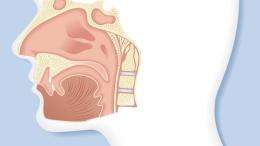When should sinus problems be a concern?

(PhysOrg.com) -- The majority of sinus infections in adults tend to be viral, not bacterial, and will likely resolve in 10-14 days, says UC Health allergist Andrew Smith, MD.
"I think I have a sinus infection.”
It’s a common declaration during cold and flu season, one that some people believe requires an immediate visit to a physician.
And while it may, the majority of sinus infections in adults tend to be viral, not bacterial, and will likely resolve in 10-14 days, says UC Health allergist Andrew Smith, MD.
Any condition that blocks off the sinus drainage channels, he says, can cause "sinusitis”—inflammation of the sinus and nasal passages—but the most common precursor to sinusitis is the common cold, which is also a virus.
The symptoms of viral sinusitis are sinus pain, pressure or drainage. These symptoms are sometimes relieved by over-the-counter medications, with most viral sinus infections resolving in about two weeks, Smith says. In order to reduce the episodes of viral sinusitis, take the same precautionary measures one takes to avoid any virally transmitted illness: Wash your hands often and thoroughly with soap and water or use an alcohol-based sanitizer for the hands, and avoid touching your eyes, nose or mouth if you can.
It’s when the sinusitis doesn’t resolve after two weeks, or includes additional symptoms such as high fever and intense, painful swelling, that it may be the more serious type of sinusitis: a bacterial sinus infection, which requires an antibiotic to kill the bacteria causing the infection.
Perhaps more important than what type of sinusitis one is experiencing is the frequency, says Smith, who is also an assistant professor of clinical medicine in the division of immunology, allergy and rheumatology at the University of Cincinnati College of Medicine.
"If you get frequent episodes of sinus symptoms, you should be asking why. And you should be working with a physician to decrease those episodes.”
Underlying conditions, such as allergies, a deviated septum or nasal polyps, which are small growths in the lining of your nose, he says, can change how your sinuses drain and contribute to chronic sinusitis.
"We can do something about these problems and symptoms; don’t feel like you have to live with it year after year,” he says.













